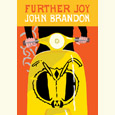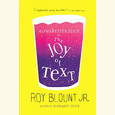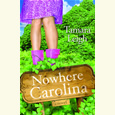Before and After
Roxane Gay confronts the truth of her obesity in Hunger
Roxane Gay’s Hunger: A Memoir of (My) Body tells the story of why and how she became morbidly obese. The book explores, frankly and in detail, what it’s like to live in a body the world feels entitled to judge. In a culture that relentlessly shames fat people, it’s an act of courage for anyone Gay’s size simply to write honestly and without apology about her physical existence, but she goes much farther here, confronting the traumatic roots of her condition and revealing her ongoing struggle to make some kind of peace with her body and with her own emotional and physical hunger.
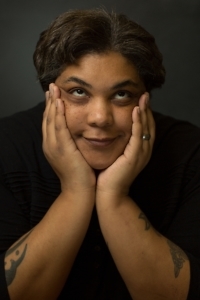
Gay was gang-raped when she was twelve years old, lured to an isolated cabin by a boyfriend, who led the assault. Out of some mixture of shame and shock, she kept the rape a secret from her devoted and loving parents for many years, though other children around her knew about it at the time and tormented her for being a “slut.” Gay, who is well known as a fiction writer and feminist cultural critic, has publicly acknowledged the rape before, but she confronts it very directly here, conveying its breathtaking cruelty in a way that’s tough to read but makes the enduring aftermath fully understandable. She traces her decades of struggle with her body to the trauma of being raped, dividing her life—in some sense, her very self—into before and after. “My memories of the after are scattered, fragmentary,” she writes, “but I do clearly remember eating and eating and eating so I could forget, so my body would become so big it could never be broken again.”
By the time she was in high school Gay was obese, and she has remained so. Now in her early forties, and despite decades of trying to lose weight, she’s large enough to need two seats when she flies coach. It’s difficult to find clothes that fit, and she’s constantly forced to navigate a world that seems designed to punish her “unruly” body: “I cram my body into seats that are not meant to accommodate me,” she writes, “and an hour or two or more later, when I stand up and the blood rushes, the pain is intense.”
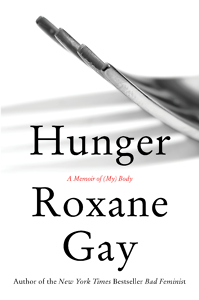 Gay’s professional success and measure of fame haven’t made people any slower to judge or quicker to acknowledge her needs. She tells an excruciating story about a publishing event where, as a featured author, she was expected to climb onto a stage and sit on a “tiny” wooden chair. It took her five minutes—with an audience watching—to get on the stage, and the chair cracked under her weight. The humiliation made her physically sick: “I threw up in my mouth, swallowed it, and then did a squat for the next two hours.”
Gay’s professional success and measure of fame haven’t made people any slower to judge or quicker to acknowledge her needs. She tells an excruciating story about a publishing event where, as a featured author, she was expected to climb onto a stage and sit on a “tiny” wooden chair. It took her five minutes—with an audience watching—to get on the stage, and the chair cracked under her weight. The humiliation made her physically sick: “I threw up in my mouth, swallowed it, and then did a squat for the next two hours.”
But the primary struggle in Hunger is the one within Gay herself. She describes a continual tension between her desire to inhabit a smaller, healthier body and her desire to remain protected by the “fortress” of her fat. Losing weight thrills and then frightens her: “I get terrified. I start to worry about my body becoming more vulnerable as it grows smaller. I start to imagine all the ways I could be hurt.” She expresses deep frustration over the way the rape affected her sexuality, through both the trauma itself and the obesity the trauma helped cause. Filled with self-loathing and unable to trust, she pursued risky encounters and developed unhealthy relationships, about which she seems to feel a mix of sadness and lingering shame.
The disrespect and disregard of the culture amplifies her pain and gets in her way, but Gay makes it clear that she owns the issue of her weight and the rest of her troubles. She is, if anything, too reluctant to assign blame, though she allows herself some frank rage against the boy who oversaw the rape, stalking him online and fantasizing about a confrontation.
Even while she was drowning in loneliness, self-destruction, and difficult attachments, Gay was also pursuing her vocation, finding some measure of solace in writing and intellectual life. Her fiction, including her 2014 debut novel, An Untamed State, garnered much praise, and Bad Feminist, a collection of essays published that same year, was a bestseller. But she states quite emphatically in the beginning of Hunger that hers is not a “triumphant story,” and indeed it isn’t, at least not in the way this society defines triumph. She can’t declare herself entirely happy or healed, and there is no justice available to her. But as an account of human strength and creativity defying cruelty and pain, Hunger is a hopeful, even inspiring book.

Maria Browning is a fifth-generation Tennessean who grew up in Erin and Nashville. A graduate of Mount Holyoke College, she has attended the Clothesline School of Writing in Chicago, the Moss Workshop with Richard Bausch at the University of Memphis, and the Sewanee Writers’ Conference. She lives in White Bluff.
